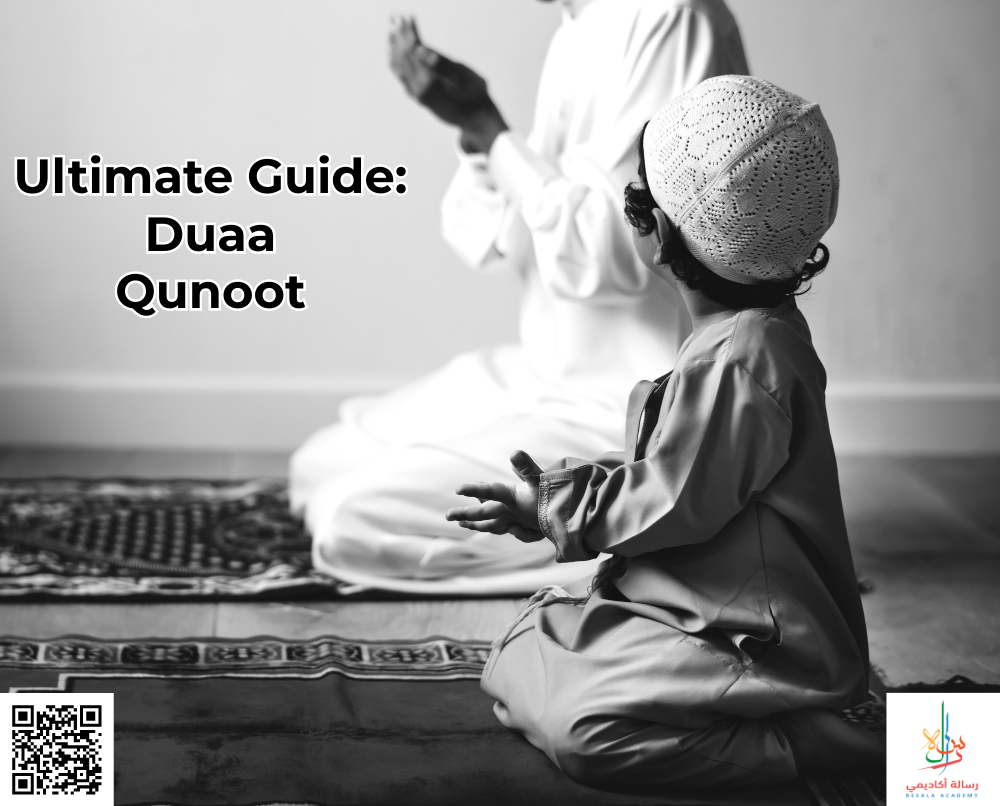Ultimate Guide for Dua Qunoot
Have you ever heard of Dua Qunoot? Are you curious to know what it is and why people recite it? If so, then this blog post is the perfect starting point for your journey. Through this article, we will explore the concept of Dua Qunoot – what it means, how to do it properly and its benefits in detail. Prepare to become well versed with a powerful Islamic prayer that has been practiced for centuries!
What does Dua Qunoot mean?
Qunut, according to the definition of the fuqaha, “is the name of a du’a (supplication) offered during prayer at a specific point while standing.”
Dua Qunoot is an Islamic prayer that has been practiced for centuries and is a powerful tool of spirituality when used correctly. The word “qunut” comes from the fuqaha and refers to a special du’a or supplication which should be recited at a specific point during prayer while standing. It holds tremendous emotional, spiritual, and physical power and can help bring one closer to Allah if they take the time to understand how it works.
When performing Dua Qunoot, people will recite certain verses or passages from the Quran in order to invoke the mercy of Allah. As well as invoking God’s mercy, by praying such a dua, one also expresses their submission and humility towards Him. These supplications may include asking for forgiveness for sins committed, protection from calamities, or seeking relief from hardships. Depending on the context of why one is praying this dua, different prayers are said with slight variations. Therefore, it is important that one learns the correct way of doing this dua in order to achieve the full benefit from it.
(اللَّهمَّ اهدني فيمن هَديتَ، وعافِني فيمن عافَيتَ، وتولَّني فيمَن تولَّيتَ، وبارِكْ لي فيما أعطَيتَ، وقِني شرَّ ما قضيتَ، فإنَّكَ تَقضي ولا يُقضَى عليكَ، وإنَّهُ لا يذلُّ مَن واليتَ، تبارَكْتَ ربَّنا وتعاليتَ)
Dua Qunoot دعاء
(Allahummahdini fiman hadait, wa a'fini fiman afait, wa tawallani fiman tawallait, wa barik Li fima atait, wa qini sharra ma qadait, fa Innaka taqdi wa la yuqda Alaik, wa innahu la yadhillu man walait, tabarakta Rabbana wa ta'alait.)
Dua Qunoot Transliteration دعاء
'O Allah guide me among those You have guided, pardon me among those You have pardoned, befriend me among those You have befriended, bless me in what You have granted, and save me from the evil that You decreed. Indeed You decree, and none can pass decree, and none can pass decree upon You, indeed he is not humiliated whom You have befriended, blessed are You our Lord and Exalted.'"
Dua Qunoot Translation دعاء
(اللَّهمَّ إنِّي أعوذُ برضاكَ من سخَطِك وبمعافاتِكَ من عُقوبتِكَ، وأعوذُ بِك منكَ، لا أُحصي ثناءً عليكَ أنتَ كما أثنيتَ على نفسِكَ)
Dua Qunoot دعاء
"Allahumma inni a'udhu biridaka min sakhatika, wa bi-mu'afatika min 'uqubatika, wa a'udhu bika minka, la uhsi thana'an 'alaika, Anta kama athnaita 'ala Nafsika
Dua Qunoot Transliteration دعاء
(O Allah! I seek protection against Your Wrath in Your Pleasure. I seek protection in Your Pardon against Your chastisement, I am not capable of enumerating praise of You. You are as You have lauded Yourself)."
Dua Qunoot Translation دعاء
(اللهم اقسم لنا من خشيتك ما تحول به بيننا وبين معصيتك، ومن طاعتك ما تبلّـغـنا به جنتَك، ومن اليقـين ما تُهـّون به عـلينا مصائبَ الدنيا، ومتـّعـنا اللهم باسماعِـنا وأبصارِنا وقـواتـِنا ما أبقـيتنا، واجعـلهُ الوارثَ منـّا، واجعـل ثأرنا على من ظلمنا، وانصُرنا على من عادانا، ولا تجعـل مصيبـتَـنا في ديـننا، ولا تجعـل الدنيا أكبرَ هـمِنا، ولا مبلغَ علمِنا، ولا اٍلى النار مصيرنا، واجعـل الجنة هي دارنا، ولا تُسلط عـلينا بذنوبـِنا من لايخافـُـك فينا ولا يرحمـنا)
Dua Qunoot دعاء
"Allahumma-qsim lana min khashyatika ma tahulu bihi bainana wa baina ma'sika, wa min ta'atika ma tuballighuna bihi jannataka, wa minal-yaqini ma tuhawwinu 'alaina masa-'ibad-dunya. Allahumma matti'na biasma'ina, wa absarina, wa quwwatina ma ahyaitana, waj'alhul-waritha minna, waj'al tharana 'ala man zalamana, wansurna 'ala man 'adana, wa la taj'al musibatana fi dinina, wa la taj'alid-dunya akbara hammina, wa la mablagha 'ilmina, wa la tusallit 'alaina man-la yarhamuna,
Dua Qunoot Transliteration دعاء
O Allah, apportion to us such fear as should serve as a barrier between us and acts of disobedience; and such obedience as will take us to Your Jannah; and such as will make easy for us to bear in the calamities of this world. O Allah! let us enjoy our hearing, our sight and our power as long as You keep us alive and make our heirs from our own offspring, and make our revenge restricted to those who oppress us, and support us against those who are hostile to us let no misfortune afflict our Deen; let not worldly affairs be our principal concern, or the ultimate limit of our knowledge, and let not those rule over us who do not show mercy to us)."
Dua Qunoot Translation دعاء
(اللَّهُمَّ أَصْلِحْ لي دِينِي الذي هو عِصْمَةُ أَمْرِي، وَأَصْلِحْ لي دُنْيَايَ الَّتي فِيهَا معاشِي، وَأَصْلِحْ لي آخِرَتي الَّتي فِيهَا معادِي، وَاجْعَلِ الحَيَاةَ زِيَادَةً لي في كُلِّ خَيْرٍ، وَاجْعَلِ المَوْتَ رَاحَةً لي مِن كُلِّ شَرٍّ)
Dua Qunoot دعاء
"Allahumm-aslih li diniyalladhi huwa 'ismatu amri, wa aslih li dunyaya-llati fiha ma'ashi, wa aslih li akhirati-llati fiha ma'adi, waj'alil-hayata ziyadatan li fi kulli khair, waj'alil-mauta rahatan li min kulli sharrin
Dua Qunoot Transliteration دعاء
(O Allah, make my religion easy for me by virtue of which my affairs are protected, set right for me my world where my life exists, make good for me my Hereafter which is my resort to which I have to return, and make my life prone to perform all types of good, and make death a comfort for me from every evil)."
Dua Qunoot Translation دعاء
what are the benefits of Dua Qunoot?
Apart from its spiritual benefits, Dua Qunoot has many practical benefits as well. It enables one to strengthen our relationship with Allah through increased faith and more meaningful prayer life; it builds resilience due to staying focused on what matters most; and also helps purify our hearts by reflecting on our shortcomings through sincere repentance. Furthermore, since these supplications are derived directly from Quranic verses, they provide us with knowledge about Islam while reminding us of its importance in our lives too!
Dua e Qunoot is a prayer that is recited in the last rak’ah of Witr prayer and can benefit us in many ways. It helps to improve our eyesight and increase Barakah in our Salary, Home, and other aspects of our lives. Furthermore, it ensures that we pray Salah in the right manner and encourages us to strive for a better life.
Reciting Dua Qunoot has been beneficial to many people who have found a sense of peace and tranquillity when they do so. It helps to strengthen faith as it connects us to Allah, allowing us to feel His presence and guidance. By opening ourselves up spiritually, we are able to take advantage of the blessings that come with prayers like this one. In addition, repeated recitation can potentially reduce stress levels by providing a calming effect on the mind and body which helps its practitioner stay focused throughout their day-to-day activities.
Moreover, Dua e Qunoot can also help those seeking material gains such as success or financial gain as its invocation is believed to bring good fortune and barakah from Allah (SWT). Not only does it open up opportunities for worldly success but also increases spiritual rewards as well because any good deed done with sincerity is seen favourably by Allah (SWT). Moreover, it also allows individuals to cultivate gratitude for the things they already have thus improving overall mental health.
In conclusion, Dua e Qunoot is an immensely powerful prayer that brings numerous benefits both physically and spiritually. Whether its goal is spiritual growth or material success, this beautiful prayer opens many doors of opportunity while keeping its practitioner connected with God’s divine mercy at all times.
The best time to recite Dua Qunoot
The best time to recite Dua Qunoor is in the last Rakat of the Witr prayer after one has recited Surah Al-Fatiha and another Surah. It is recommended to recite slowly, with deep concentration and understanding, so that all its meanings are internalized in order to gain maximum benefit from it.
How to make the most of Dua Qunoot
In order to make the most of Dua Qunoot, it is important to understand its meaning and reflect on its words. Contemplating on the significance of each supplication helps in deepening one’s spiritual connection with Allah (SWT) and allows us to truly appreciate His grace and mercy.
Moreover, one should have faith that Allah (SWT) will respond positively to their prayers when they are recited with sincerity and humility. Having a sincere intention during prayer is essential in allowing the blessings of Allah (SWT) come into our lives, thus making it easier for us to achieve our goals.
Finally, we must remember that prayers are more than just memorized words; they are an emotional connection with Allah (SWT). When we come to Him in sincerity and humility, He will reward us greatly. Therefore, it is important that we ensure that our hearts are open to receive the blessings of the Lord when reciting Dua Qunoot. Insha’Allah our supplications shall be answered!
May Allah (SWT) accept our prayers and grant us all His divine grace, Ameen.
In summary, Dua e Qunoot is a powerful prayer that can benefit us spiritually as well as materially. It helps to increase faith and understanding of Islam while providing comfort and tranquillity for its practitioners. Furthermore, if performed with sincerity and humility, one’s prayers are likely to be answered by Allah (SWT) and one can potentially achieve success in worldly matters. Therefore, it is important that we all make an effort to understand the significance of this prayer and use it as part of our regular worship. May Allah (SWT) accept our prayers, Amee
is dua e Qunoot compulsory in Witr?
No, it is not compulsory to recite Dua Qunoot in Witr prayer. The Prophet (PBUH) used to recite it but did not make it an obligation on his followers. Therefore, one may choose to recite any other supplication or refrain from doing so altogether while performing witr salah. However, due to its immense spiritual significance and benefits, many scholars do encourage reciting this beautiful dua as an optional addition during one’s personal prayers. May Allah (SWT) grant us all His divine blessings, Ameen.
What if I don t remember dua qunoot?
It is not necessary for one to recite words of supplication specifically narrated from the Prophet (peace and blessings of Allaah be upon him) when performing dua qunoot. In fact, it is permissible for the worshipper to choose other words as a form of du’aa’ or to extend beyond these by adding verses from the Qur’an which contain supplications that could also suffice in regard to Qunoot. Imam al-Nawawi (may Allah have mercy on him) clarified this point by noting that there is no specific du’aa’ required in order for Qunoot to be considered valid; however, he did mention it is preferable to repeat those words reported in the Sunnah. It is worth mentioning that despite the absence of certain texts specifically detailing what should be said during Qunoot, one can easily find numerous instances throughout Islamic literature which provide more insight into this practice. Furthermore, scholars have established that uttering words of supplication coupled with sincere devotion and humility will grant one greater spiritual benefit regardless of which particular phrases are said.
Do you want to study more Islamic Teachings, Resala Academy can help!
At Resala Academy, we strive to provide our students with a comprehensive understanding of Islamic teachings by offering courses that cover various topics related to Islam such as the Qur’an, Hadith, Fiqh and Tafseer. Our classes are taught in an interactive and engaging way which allows students to gain meaningful knowledge while having fun along the way. As part of our commitment to providing high-quality education, we also offer additional resources such as lectures, webinars and other materials which can be accessed at any time. Whether you are looking to gain general knowledge or delve deeper into specific areas like Dua Qunoot, Resala Academy is here to help! Join us Today.
Conclusion
Dua Qunoot is an important and powerful prayer that Muslims all over the world recite during their daily prayers. Not only does it have immense spiritual significance but also provides comfort, tranquillity and peace to its practitioners. It is a du’aa’ which needs to be recited with humility, devotion and sincerity in order for one’s supplications to be answered. Furthermore, due to its numerous benefits, scholars encourage and advise us to incorporate this dua into our regular worship routine. Resala Academy provides various educational services to help students gain a deeper understanding of Islamic teachings such as Dua Qunoot. Join us today and take the first step towards strengthening your faith! May Allah (SWT) accept our prayers, Ameen.




